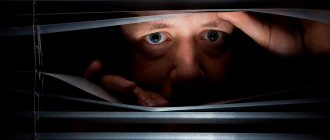.
Every second a person hears something. Conversations, the sound of a radio or TV, the ticking of a clock and even the sound of the wind create a certain background. Sounds, regardless of a person’s desires, surround him, becoming an integral part of existence. And all this is connected with the psyche so tightly that a fear of silence can develop.
This phenomenon in psychology is called silensophobia. It is expressed by the difficulties of adapting the psyche to silence.
Iremophobia or silensophobia
For the first time, psychotherapists started talking about this type of fear as a disease in the middle of the twentieth century.
Millions of people who work in noisy, crowded offices, shopping centers, and factories are frightened by sudden silence and suffer from a phobia of silence. Experts quite reasonably believe that their number will grow in the near future. The situation with the disease is complicated by the fact that approximately 90% do not pay attention to the problem, trying to ignore it. Few of those who are afraid of silence turn to doctors. Some are embarrassed to discuss their phobia even with their family, ashamed of their condition. Tension and anxiety are relieved with sedatives or alcohol, destroying the body and soul. Why the phobia of silence is dangerous, what symptoms it expresses and how to get rid of it - you will learn about all this from the article.
How to determine pathology?
Many people who suffer from a fear of silence experience symptoms for several months. Even if there is no reason for negative emotions, a person feels discomfort. In addition, pathology often manifests itself in the most ordinary situations. Symptoms of fear intensify, at first the fear causes only a slight feeling of anxiety, and then leads to the development of panic attacks. A person’s quality of life deteriorates, and their well-being is also impaired. The need to listen to music or watch TV before bed deprives him of a full night's rest.
If a person notices such signs in himself, he should consult a specialist.
Psycho-emotional and pathological causes of jeremophobia
Like other unusual, specific fears, silensophobia develops in response to traumatic shocks or situations involving a threat to health and life.
The most common reasons for developing a fear of silence:
- Childhood traumas. In order for the child to sleep soundly, parents reliably isolate his room from extraneous noise: install double and triple glazed windows, lay soft flooring, turn off the TV and other sound sources. Against the background of such all-consuming silence, any sharp sound, be it a pen falling to the floor or a door slamming, frightens the child. Impressionable kids may completely refuse to sleep in their room without the TV or other sound source on, giving silence negative associations.
- Silence as a punishment. Jeremophobia, as well as the fear of the dark or closed spaces, often develops in children who are locked in remote rooms, basements, dark closets or closets as punishment.
- Self-identity problems. Often people who lack self-confidence and suffer from a lack of realization of their own skills are afraid to remain in complete silence. They tend to keep themselves busy so as not to be left alone with negative thoughts.
- Negative associations. The fear of silence can be imposed by books and films in which moments of complete and oppressive silence are accompanied by negative events.
Fear of silence can also be a sign of serious pathologies:
- hormonal disbalance;
- disorders of the adrenal glands;
- deep chronic depression;
- schizophrenia, paranoia accompanied by audiovisual hallucinations.
Causes of phobia of silence
A phobia can begin to develop in childhood as a result of a shock experienced. In an adult, the disorder often appears after traumatic situations. However, there are a number of factors not related to a threat to health or life that can cause the development of silensophobia:
- Gloomy associations. When reading books or watching films, a person encounters episodes in which oppressive silence is associated with approaching danger, a negative event. This association can become ingrained in the mind.
- Reluctance to be alone with one's own thoughts. If negative images are intrusive, there is a desire to drown them out with extraneous sounds. This is often characteristic of insecure individuals suffering from the impossibility of self-realization. Making artificial noise is a way to distract yourself from negative thoughts.
- When putting the child to bed, parents pay undue attention to silence. Being in a vacuum with a complete absence of sounds, a child may be frightened by any random noise from a fallen toy or an opening cabinet door. A negative perception of silence is formed, leading to the development of a phobia.
The disorder is often observed in people who were punished as children by being locked in a room. Psychologists also associate phobia with a refusal to accept one's own loneliness. Silensophobia in most cases is a sign of deeper psychological problems.
From a medical point of view, fear of silence may be one of the manifestations of hormonal or adrenal dysfunction. In the presence of chronic depression, paranoia or schizophrenia, this human condition is one of the symptoms of the disease.
Reasons for developing a fear of going outside
- Heredity
. Quite a large number of specialists in the field of psychiatry are confident that all neuroses should be considered exclusively at the genetic level of manifestation of a certain pathology. Based on the results of their research, it can be concluded that a fifth of the population who are afraid to go outside borrowed a similar model of behavior from their parents. Sometimes a “gift of fate” can even be passed down from grandparents. - Increased anxiety
. People with an overly excitable psyche are afraid of everything, even their own shadow. For them, leaving the house is a feat that they are not going to accomplish. If we make an analogy with animals, then a person of this type automatically turns into a turtle, which is securely hidden in its shell. - Diffidence
. People whose complexes play a dominant role over other priorities try not to leave their native walls again. In every glance of a passerby, they see disapproval and even censure, which puts such poor fellows into a stupor and even depression. This is often encountered by young mothers after childbirth, and women in adulthood who find it difficult to control their weight. People with a pronounced defect in appearance (large birthmarks, growths on the body, etc.) are also susceptible to fear. - Disability
. People with disabilities often try to isolate themselves within four walls, because this is where they feel safe. For them, the street is a high-risk zone, even if they live in a quiet rural area. - Dysfunction of mental regulation
. In some anxious individuals, biological processes in the brain malfunction. In this case, there is an imbalance of reflex functions that must be controlled by consciousness. - Expansion of the stressful situation
. A child’s fear of entering a dark room can later develop into a much more serious phobia. The expression “my home is my castle” is also beginning to be perceived by some people as an unconditional verdict. - Low social status
. In this case, we are not talking about embarrassment and fear of becoming a laughing stock in the eyes of more successful people. A person who is afraid to leave home, in most cases, simply does not want to see a higher standard of living in the society that surrounds him. It’s easier for him to close himself in “his own box” so as not to correct anything and not fight to change the situation. - An accident that occurred
. If the poor fellow became a hostage in the past or observed some kind of disaster, then he will not have the desire to go out into the street again. After suffering stress, such people become hermit crabs who feel quite comfortable in such a situation. - Definite addiction
. In this case, we are not talking about alcoholics who, in the cold and cold, will leave the house in search of a strong drink. Those same computer gamers are so oblivious to reality that even a trip to the nearest bakery seems like a feat to them. - Accompanying effect
. Some phobias in humans tend to intertwine quite harmoniously with each other. Against the background of one mental pathology, another emotional anomaly is quite capable of developing, which leads to a fear of going out. - Fear of death
. Every adequate person does not want to say goodbye to his life before the scheduled date. However, in some cases, such a desire turns into a certain mania. People who fear death every second are simply trying to make a fortress out of their home. For them, going outside is equivalent to a death sentence for themselves. - Internal dictate
. Very often, parents prohibit young children from communicating with their peers outside the walls of the house, scaring them at the same time and inventing all sorts of horror stories. After personality maturation, mature adolescents may then perceive the street solely as a threatening factor.
How to help a child?
Of course, we have not considered all children’s fears, but only the most common ones.
In some cases, phobias are really associated only with age, and they go away on their own. But still, the cause of fear can be a negative situation experienced by the child. In addition, fear sometimes “grows” into the child’s psyche and, without proper help, leads to unwanted problems in the future. If you notice a phobia in your child, under no circumstances scold him for showing fear. During attacks, switch your baby's attention to something pleasant and interesting. When he is completely calm, talk about the “scary” topic, trying to find out what exactly scares the child so much.
If children's fear goes beyond reason and turns into panic attacks or an overly emotional reaction, contact a neurologist or child psychologist. Sometimes without therapy it is impossible to restore balance in the baby’s nervous system.
Treating the fear of silence
But self-medication is not always able to cope with the phobia of silence. In many advanced cases, you cannot do without the help of a specialist. Irrational fear can be treated with medication and psychotherapy. Everyone has their own fears and weaknesses. You shouldn’t try to hide them, be ashamed, or ignore them. It's easier to accept and fight.
Psychological help
The first stage of treatment is contacting a psychotherapist. The doctor will find out where the fears come from, how long ago they have settled in your brain, and prescribe a course of treatment.
Professional techniques of neurolinguistic programming or hypnosis relieve the psyche of anxious panic moods and speed up the recovery process. Cognitive behavioral therapy and systematic desensitization help cope with anxiety.
Art therapy methods are used to combat phobias. Drawing, sculpting, and creating photo collages promote personal self-expression by correcting mental processes. As a result of psychotherapeutic treatment, the phobia of silence decreases in size, and ways of human behavior that are adequate to the situation and the corresponding preconditions for anxiety are formed. Group and individual forms of classes are used.
All these treatment methods help to clarify the origins of the fear of silence, analyze them, and allow you to overcome the phobia once and for all.
Medication methods to combat silensophobia
Most often, drug therapy is used to get rid of the fear of silence. 1. Tricyclic antidepressants are used to combat depression: Moclobemide, Sertraline, Fluoxetine. Neurotransmitters, which are part of the drug, effectively restore the psyche. 2. For panic attacks, benzodiazepines are prescribed: Imiprapine, Phenazipam, Alprozolam. 3. To eliminate problems of the cardiovascular system caused by phobia, beta blockers are used. 4. Psycholeptics, in particular Busporin, reduce anxiety. All sedatives consist of components of plant origin, but you should not take them yourself, since the wrong dosage can be dangerous to health and cause harm instead of benefit. Only the attending physician is able to take into account all the pros and cons of using medications and select the ones that are suitable for the patient.
Drug treatment for silensophobia
Not only psychologists and psychotherapists, but even psychiatrists will help you get rid of phobias. The patient may need the help of the latter during acute manifestations of the disease. The most common is drug therapy.
The following types of medications have become widespread in treatment:
- Tricyclic antidepressants. Most often used to combat depression. The action of the components of the drug, neurotransmitters, is based on the restoration of the psyche. The most common drugs: Moclobemide, Sertraline, Fluoxetine, etc.
- Benzodiazepines. Also used for panic attacks. The most popular drugs are: Imiprapine, Phenazipam, Alprozolam, etc.
- Beta blockers. They are used to eliminate signs of phobias, most often problems with the cardiovascular system.
- Psycholeptics. Reduce anxiety. The most popular medicine is Busporin. The selection and specifics of the use of drugs are carried out by the attending physician.
Herbal sedatives
It is prohibited to take medications on your own due to health hazards in case of incorrectly calculated dosage and side effects.
Definition of a phobia of silence
Fear of silence can be called differently: in literature it is often found under such designations as silensophobia and jeremophobia.
Under the influence of his emotions, silensophobe falls into a state of deep anxiety and panic. When a phobic disorder is severely neglected, it is unbearable for a person to be in any situation that requires silence: when taking a written test, visiting a library, etc.
Often the phobia of silence is complemented by the fear of loneliness. Filling the “ether” with the endless sounds of radio, music, TV, conversations, video games, a person tries to cope with the fear of being left alone.
The technological revolution has irreversibly changed the world. Now life does not allow a person to remain in a sound vacuum for a second: background noise fills all spheres of his existence. If a silensophobe is “snatched” from his usual noisy life in a metropolis and sent to a deserted environment, for example, a protected area or a lonely house in the forest, this will cause him deep psychological trauma.
Reasons for the development of fear associated with pathologies
Fear of silence can be caused by the following ailments:
- Hormone imbalance.
- Disorders of the adrenal glands.
- Depression.
- Delirium.
- Schizophrenic disorder.
Sometimes, under the influence of hallucinations, a person cannot calmly be in a silent and unlit room. What is the name of the phobia of fear of darkness and silence?
Such phenomena are designated by the terms “nyctophobia” and “silensophobia”, and they are often associated and observed in the same person.
Treatment of silensophobia
Fear of silence can be managed if it is not caused by mental illness. To cure, psychologists recommend assessing the scale of the problem. It is necessary to analyze the frequency of episodes and the circumstances that caused the attack of phobia.
The following techniques are effective in combating silensophobia:
- Meditation. It is necessary to instill the understanding that absolute silence does not exist in the world. This will gradually lead to the realization that there is nothing to be afraid of. In this case, it is necessary to limit sound sources. For example, stop sleeping with headphones on or turn off the TV before bed.
- Silent reading or aromatherapy are effective means of combating phobias.
- Deep breathing. Take a comfortable position, close your eyes and relax. Take a deep breath. Then imagine how all the fears and tension come out along with a slow exhalation.
- A good technique would be to express your own fears in painting.
In case of severe manifestations of the disorder that impair psychological health, the help of a psychotherapist will be needed. Treatment uses hypnosis and drug support.
The use of medications gives a temporary effect. After stopping the treatment, the fears return. Medicines are used for auxiliary therapy against the background of the main treatment. In different cases, antidepressants and psycholeptics are prescribed. Beta blockers are used to support the functioning of the heart and blood vessels.
I like the article I don’t like the article
How to get rid of the fear of the dark?
Various techniques have been developed to overcome the fear of the dark. But it all depends on the severity of the problem and personal characteristics. If a person is practically not worried about such a phobia and does not affect his daily life in any way, then it is possible to cope with fears on his own.
The rules of conduct are simple but effective:
- watch less news and horror movies;
- communicate with positive people;
- walk and spend free time “in the open air”;
- relax and exercise the body physically;
- create a pleasant environment and bright interior.
Extreme isolation
While in prison, a person still knows that perhaps he will someday be released. Hope and purpose help him overcome loneliness even in the punishment cell. But it is more difficult to maintain sanity for those who are left under the rubble, lost in the catacombs or underground caves.
If you went to the mountains, live in an area with high seismic activity, or live in an emergency building, remember how to behave if you suddenly find yourself under rubble:
- Do not make sudden movements.
Do not try to pull out a limb stuck under the rubble. This can provoke an even greater collapse. - If your phone is intact, use it.
Try dialing the emergency number. If there is no connection, check if the built-in flashlight is working. Try to save the battery and turn on the flashlight periodically to spend a little time in the light or to give a signal. - If you have any metal object, move it, move it from side to side.
This will help the rescuers' metal detector find you faster. - Vote periodically
. Every hour, rescuers announce a time of silence so that the voices of people under the rubble can be heard. - Try not to give in to negative thoughts.
In such a situation, a lot of stress hormones are released in your brain. They create panic. Your task is to remain calm and occupy your brain with some mental task. The less you panic, the longer you will hold out and the more likely you are to be rescued.
Interesting fact
Aftermath of the 2010 Haiti earthquake boston.com
Fear of silence
Lent ends, and the understanding and awareness of the gifts that it gives to the Orthodox Christian becomes ever clearer. Of course, as in any other time of abstinence established by the Church (whether long or short-day fasts), on Holy Pentecost we are called to get rid of passions and prepare for a joyful meeting with Christ. And to the best of our ability, we try, with God’s help, to succeed in this endeavor. But even starting from the first week of Lent and ending with the service of Holy Saturday, we, listening to the chants and readings heard in the Church, learn to remain silent.
Modern man has set himself to be the measure of all things. "I know what I am saying! I said so! Better listen to me!” – with such and similar phrases we are used to proving that we are exceptionally right. We, who have lost the connecting thread of history, who have overthrown the “old and dilapidated” ideals, who strive to put everything and everyone into our service, are not accustomed to being silent! The irrepressible “ego” requires irrepressible attention to itself, which cannot be achieved through silence. And that’s why we strive at every step to express our opinion on all issues, to tell the “truth” about everything we know, to inform everyone about our successes and the defeats of others!
We are not accustomed to cherishing and reverently cultivating thoughts and words in our heads and hearts - on the contrary, we strive to uproot the early “shoots” that have just appeared and demonstrate them to everyone. Modern man has a lot of words, a lot of sounds, a lot of unnecessary movements, but out of this whole “mass of much,” a very insignificant part turns out to be useful. Much ado about nothing!
Noise. We are used to it. The noise of the streets, the noise of human bustle, the noise of music in headphones, the noise of the TV at home. We are unaccustomed to silence! We have unlearned the value of silence and peace! Leave modern man alone in a field far from civilization, without any gadget that generates sound... Silensophobia (or iremophobia) is the fear of silence. This is a diagnosis that can now be made to literally every city resident. But why are we afraid of her? I dare to suggest that because we are not in it, or rather, in it we “sound” not as we are used to, but for real.
It is in absolute silence that the creak of our soul can be heard, sagging like an old cart under the weight of passions and sins. In the silence we can hear the quiet but incredibly loud voice of our conscience denouncing us! In the silence we understand that all our loud, truthful and sincere words are sometimes nothing more than just a stupid shake of the air.
Our world sometimes reminds me of a hive full of buzzing drones, among which humble bees are barely visible, working in concentrated silence. And if the drones sting each other in vain and buzz without ceasing, then the individual bees next to them, not paying attention to their loud “Z-Z-Z-Z”, work all day long in silence, only showing by their example that another way of being.
I remember the beginning of Lent: the first week, the first long services, against the backdrop of the buzzing world around us - quiet prayer in the temple. There are rare chants, and almost the entire service is spent in silence and reading. It was then, in the service, that the understanding of the absurdity of the noise comes. “God is not in the stormy wind,” as in Elijah, but, on the contrary, “the voice of the cold is thin, and there is the Lord” (1 Kings 19. 11-12).
- Be silent, listen and pray in this blessed silence, man! - the Church offers us.
- Silence? Like this? Why be silent about anything at all? - our arrogant mind is ready for rebellion.
- Be silent to hear the voice of God! Be silent to hear your soul! Be silent, because all your words are just meaningless buzzing! Be silent in order to understand the value and beauty of every word and through this get closer to the only important Word, Which everything began to be! (see John 1.3) - the Church addresses us through the readings and hymns of the Great Pentecost.
Here it is - terrible SILENCE!!! Why scary? Because it’s unusual, because you’re alone with God, and also hearing the unbearable howl and hubbub of passions tormenting your soul! Scream? Yell? There is no need, and it is pointless! Because scream not at someone else, but at your own laziness, pride and irresponsibility! And scream only about exclusively YOUR own irresponsibility, carelessness, connivance. Silence and quiet prayer - salvation from this, it is not clear when and how the “screaming hell” settled inside us.
And then gradually comes the joy of silence, the joy of silence, the joy of Holy Saturday...
“Let all human flesh be silent, and let it stand with fear and trembling, and let nothing earthly think within itself,” we hear during the liturgy of Holy Saturday. And now we are silent no longer because of some slavish fear, not because we “have to” - we are silent because we understand the preciousness of what is happening! “The jewel of silence” is a category that is far from modern man and at the same time so vitally necessary for him. In the silence of the temple, the miraculous Annunciation takes place, in the silence of the Bethlehem night the Savior is born, in the silence of the desert the devil tempts Christ, in the silence of Gethsemane the One who “redeemed us from the legal oath” prays “until he sweats blood”, in the silence the myrrh-bearing women rush to the tomb of their Teacher...
The very joy of Easter of Christ is the triumph of the Humble, Quiet and Silent over the screaming, yelling and growling hell.
Our world was created in silence. Silence is the highest form of prayer and standing before God. When He is near, no words, loud phrases, or bright slogans are needed. Lent, among other things, returns to us the lost virtue of silence. Silence not in the sense of indifference and indulgence in sin, but in the sense of abstinence from idle talk and idleness, so characteristic of us.
Reasons for the development of the disorder
Technical devices are constantly present in the life of a modern individual. Background sounds fill every second of human existence. Persons with a fear of silence cannot remain calm in a lonely hut in the middle of the forest or in protected areas.
This situation makes them uncomfortable. Today many people face a similar problem. The question of what the phobia is called - fear of silence - and why it occurs is quite relevant. Experts say that the phenomenon is associated with negative or dangerous events.
The most common causes of the disorder are:
- Severe fear in childhood. Many caring mothers and fathers try to protect their sleeping baby as much as possible from sound stimuli. They make double glazing, install soft coverings on the floor, turn off the radio. In the absence of noise, even the dropping of a pencil or the creaking of a door can cause a feeling of fear in a child.
- Using isolation from sound stimuli as punishment. The fear of silence develops in children who were locked in basements, pantries, closets, and dark rooms.
- Associations. They are often associated with reading books or watching horror films in which, after a long absence of sound stimuli, frightening events happen to the characters.
- Personal problems. Lack of self-confidence and inability to realize aspirations leads to the fear of being left alone. In this situation, a person tries to fill the void and cope with the flow of negative thoughts. To do this, he turns on the TV or music, talks on the phone.
Features of the pathology
Every person is familiar with the state of fear. However, if this feeling occurs frequently and interferes with leading a normal lifestyle, experts speak of a mental disorder. One of these pathologies is the fear of silence. This fear is called silensophobia. It lies in the inability to normal perceive the absence of sounds. People refuse to be in a quiet place. They strive to constantly receive information from the outside world. Audiobooks, radio, telephone conversations, and TV are used for this. With a phobia of silence, the absence of sound stimuli provokes discomfort. Indeed, in this situation, a person is left alone with his emotions. In severe cases, even performing a written test and being in the library causes discomfort.
Fear of external noises
It is natural for a person to be afraid of loud sounds, to shudder and look back in the direction of the noise. This is a defensive reaction to exposure to a sharp external noisy stimulus. The reflex is developed from birth: a newly born baby reacts to external noise by spreading its legs and arms in different directions. Fear of noises is normal unless it becomes an uncontrollable phobia. It is also called ligyrophobia and acousticophobia. Sometimes these terms are used as synonyms, although there are inconsistencies. Literally translated, phonophobia is the fear of loud sounds. Acousticophobia is auditory-coordinated fear. Ligyrophobia is the fear of extraneous noises and devices that produce them.
Humans react to loud noises from birth
Reasons for appearance
Like all specific phobias, fear of silence is usually triggered by traumatic or adverse life situations.
Scientists identify several main causes of iremophobia:
- Children's fears Parents' attempts to provide silence for a sleeping child can be interrupted by an unexpected sound, which causes anxiety and gives rise to an unconscious association with something incomprehensible and scary.
- Silence phobia arises as a result of child punishment, when cruel parents lock their children in basements, closets, dark closets
- Fear of oneself Insecure people suffering from an inferiority complex, left alone, are afraid of the opportunity to evaluate their thoughts and actions
- Public places The absence of sounds instills a pathological horror in a person, the roots of which grow from emotional memories of silence as a harbinger of sudden troubles. Technology. Telephones, televisions, computer clubs, smartphones with many sound functions have become an integral attribute of life.
- Watching Movies Quite often in movies, the climax is preceded by a “deafening” silence, followed by something terribly tragic.
- Uninhabited natural environment The absence of background noise in forests or other uninhabited areas is associated by individuals with the existence of evil spirits who come out in silence to hunt people
Other reasons for aversion to silence include abnormalities in the functioning of the adrenal glands, hormonal imbalance, depression, and delusional paranoia.
The fear of silence is associated with other fears. Modern man is inextricably linked with society, playing a certain social role on the stage of life. And when even the slightest change occurs in the established order of things, discomfort sets in.
Signals of more complex problems
- unwillingness to realize your loneliness;
- fear of being alone with your secret experiences;
- inability to cope with surging emotions.
Silence puts pressure on the psyche, and in order not to “listen” to it, a person turns on the TV, calls friends, puts on headphones, protecting himself from disturbing worries with the sounds of music.
The phobia of silence forces you to constantly be busy with something. Even before going to bed, the patient does not want to disconnect from the outside world - he watches a movie, listens to radio broadcasts.
Other Possible Causes
The prerequisites for the development of fear of silence are individual in nature. Sometimes negative emotions experienced in early childhood contribute to the emergence of a phobia in an adult. Some people, for example, say that the emergence of fear is associated with news of the death of a relative or other unpleasant events. Such situations are usually accompanied by silence. Therefore, a person experiences fear in the absence of sound stimuli. In addition, parents often scold their children for noisy behavior. Babies are naturally energetic and restless. They always try to attract attention to themselves. If a child does not shut up at the request of adults, he is punished.
Sensitive individuals may develop a fear of silence. In addition, the absence of sound stimuli is typical for uninhabited areas and forests. Superstitious people believe that evil spirits live there. They try to avoid being in such places.
Symptoms of fear of silence
Silence phobia is accompanied by the following physical signs:
- weakness, dizziness;
- pallor of the skin caused by narrowing of small arteries in the skin;
- tremor of the limbs;
- hyperhidrosis: especially the palms and head sweat, while the skin remains cold to the touch, the person may feel chills;
- increased heart rate;
- dry mouth, feeling of jaw stiffness, possible loss of voice;
- panic attacks;
- accelerated shallow breathing: a person may feel as if he is suffocating;
- nausea, urge to vomit;
- muscle spasms.
At the psychological level, attacks of jeremophobia are accompanied by the following symptoms:
- feeling lost, useless, thoughts of suicide;
- inability to think logically;
- disorientation;
- the desire to hide (both from other people and from oneself, one’s thoughts and fears).
How to define silensophobia?
Silensophobia manifests itself over a long period of time—months or even years. In the absence of apparent reasons for concern, a person may experience severe psychological discomfort. The fear of silence can appear unexpectedly, in the most trivial situations.
With each new episode, the fear becomes more intense: from mild tension and anxiety it develops into deep panic. This greatly affects the quality of a person’s personal and social life and disrupts his mental and physical health.
Fear haunts a person continuously, which forces him to constantly look for something to do. He experiences special pressure from silence at night: in order to fall asleep normally, a silensophobe needs to turn on music, a movie or an audiobook.
Manifestations of the disorder
Regardless of the cause of development, a phobia has a number of manifestations by which its presence can be determined. The fear of silence is expressed in the following:
- panic attack;
- dizziness, general weakness;
- increased heart rate;
- dry mouth, loss of voice;
- tremor of the limbs;
- rapid breathing, feeling of lack of air;
- pale skin;
- nausea, vomiting;
- sweating disorder;
- muscle spasms.
In combination with external manifestations, disorientation, a feeling of loss, and a desire to hide from one’s own thoughts are noted. The ability to think logically disappears, and thoughts of suicide may arise.
The development of this disorder occurs gradually. At first, in the absence of actual reasons for concern, psychological discomfort is observed; the person cannot explain his emotions. Episodes of fear are mild in nature, appearing unexpectedly in familiar situations.
Gradually, the intensity of the attacks increases, mild anxiety turns into a state of panic. Mental health is impaired, which affects physical well-being, the quality of social and personal spheres of life.
In the future, fear becomes continuous, which encourages a person to be constantly busy. There is a need for continuous sound of music, TV, radio. At night, the pressure of silence makes it difficult to fall asleep.
How to identify iremophobia
You can determine the development of pathology yourself. The main symptom that distinguishes the fear of silence is that the phobia manifests itself over a long period of time, over several months and even years. Psychological discomfort arises suddenly, in everyday life situations, but does not disappear, but, on the contrary, increases. A person is haunted by an insurmountable reluctance to remain in silence, nervousness develops into causeless panic, and there are no visible reasons for this state. Life becomes unbearable, there is nowhere to hide from fears and dark thoughts.
Rationalization. Getting rid of the fear of silence on your own
If panic hits you and takes you by surprise, you need to take a deep breath, calm down, and begin to rationalize what is happening in order to determine the severity of the anxiety. Any type of fear goes away if you carefully analyze it and understand what really happened
As in every business, it is important to take the first step - mentally put everything into categories, sort it and answer the question for yourself: “Why does silence frighten me?” When we begin to think actively, a psychological revolution occurs in the brain. The problem turns from a global one into a small misunderstanding that is easy to fix
The second equally important step is to create conditions that can destroy the shell in which the phobia of silence hides in order to stop being afraid.
We need to stop constantly looking for the source of noise:
- do not sit for hours at the computer, distracting yourself from loneliness;
- do not turn on the TV in the bedroom before bed;
- do not sleep with headphones, listening to music, lectures, audiobooks.
Self-hypnosis has not only destructive, but also creative power. The main thing is to realize the problem, begin to perceive silence as a natural psychological background, and encounter it more often. You need to teach yourself to relax in a timely manner, get rid of tension, and control your emotions and experiences. Deep breathing techniques, muscle relaxation, and meditation help with this.
This exercise is beneficial: sit or lie down comfortably, completely alone, close your eyes, inhale deeply, exhale slowly for at least 10 minutes. Along with the air, worry and anxiety leave the body, the fear hidden in silence disappears, and happiness settles in the freed space. Yoga classes prevent the appearance of obsessive thoughts.
You can avoid the signs of iremophobia by visualizing fear - embodying your feelings and anxieties in drawings. Each sound has its own physical form, size, color. The world is full of sounds, they are born every second, and complete silence is just a myth, a fantasy that does not exist in reality. Family members can play an important role in overcoming the fear of silence. Talking about a phobia with a loved one can provide significant support and assistance. Having gotten rid of the fear of loneliness in silence, you can enjoy all the delights of life.
Treatment
Family members can play an important role in supporting a person to overcome the fear of remaining silent. Talking about the phobia with a loved one (or in group therapy) can be of some help. It is strongly recommended that you seek professional assistance from a hypnotherapist or psychiatrist.
Today, many modern treatments such as CBT (or cognitive behavioral therapy), NLP (neurolinguistic programming) and systematic desensitization are known to help reduce anxiety. All these treatment methods help to identify the root of the fear of silence and allow you to overcome the phobia once and for all.
Causes of loud noise phobia
Attempts to hide your condition from others only intensify the manifestation of symptoms. As the stimulus is eliminated, the internal state normalizes and manifestations of fear of loud human sounds disappear. The causes of this disorder can be caused by a childhood fright or an incident at a noisy crowded event with serious consequences.
At an early age, tragic events might be remembered by the sound of sirens or music at an ill-fated concert. In the future, the unprocessed psychological trauma will remind itself when a similar sound environment is repeated.
Chronic stress, vegetative-vascular dystonia, neurasthenic diagnoses can also become conductors of phonophobia.
In addition to the psychological component, fear of loud sounds can occur with rabies, a dangerous viral disease.
The development of this pathology is facilitated by suspicion, excessive emotionality, and a prolonged state of nervous tension. The resulting depression, lack of moral strength, and even falling into alcohol or drug addiction is the other side of phonophobia. Therefore, the question of treating or letting everything take its course is not worth even thinking about.
Symptoms of fear
Iremophobia or silensophobia is the fear of silence. People who suffer from such fear cannot remain for a moment in a place where there are no sounds. This sound could be a conversation, music, or the TV on.
The fear of silence constantly forces a person to be in search of some kind of activity. Even when a person is getting ready for bed, he is unable to disconnect from the outside world. There is a desire to watch a movie or listen to music. Pronounced symptoms include:
- increased sweating;
- dry mouth;
- trembling in the body;
- dizziness;
- strong internal tension;
- increase or decrease in body temperature;
- loss of ability to think clearly;
- severe panic attacks.
Symptoms
Excessive noise can be debilitating and cause headaches. Staying in silence from time to time is useful, but not for people with iremophobia. A person develops a panic attack, which is characterized by the following symptoms:
- Shiver
- Dry mouth and sweaty palms
- Inability to speak
- Feeling disconnected from reality and having thoughts about death
- Numbness or, conversely, the desire to hide, run away
- Rapid heartbeat, nausea, gastrointestinal disorders.
Sometimes a person suffering from Iremophobia may feel fear in a group of people, when those around them stop talking or there is a lull in the conversation. Spending time in the library, taking a written exam, or even sleeping alone is a scary experience for those who are afraid of silence.
How to overcome fear of people?
If you are wondering how to overcome your fear of people, there is only one way out - psychological and medical treatment. There is no specific treatment for anthropophobia alone. Hypnosis works well in the treatment of any phobias, as the trigger of the phobia is removed.
Of course, treatment varies from person to person and is based on the severity of the phobia. Common forms of treatment include various types of therapy, medication, and relaxation techniques.
Therapy is extremely helpful in treating phobias, especially when combined with other forms of treatment. In addition to "just talk" therapy, healthcare providers will also work with patients through cognitive therapy until the fear response is completely eliminated. Cognitive therapy directly identifies anxious thoughts and attempts to replace them with rational and positive thoughts.
This can be helpful for people who suffer from certain phobias, as their fears may be unfounded. Relaxation training is extremely beneficial for people suffering from the effects of anxiety. This type of training includes the use of breathing exercises, hypnosis, and guided imagery.
Relaxation training can help alleviate both the emotional and physical reactions that occur in response to phobias. The individual is also taught to use coping skills to redirect the stress response.
Medication treatment is the right option for those suffering from excessive anxiety caused by a phobia. But medications do not cure phobias. It only helps relieve symptoms that are felt physically or emotionally.
For example, a person may have a fear of birds. They may be prescribed anti-anxiety medications or beta blockers when they have to face their fears.
It is important that only renowned and professional doctors recommend medications for patients suffering from phobias. Drug treatment may be harmful for some people, so it is important to answer any questions the psychologist may have about your past emotional or physical well-being
Why are people afraid of silence?
So why are we so afraid of peace and quiet? Why do we feel discomfort when we are alone with ourselves? Why does it become so desperately uncomfortable when life gives us such an opportunity? A wonderful book was recently republished
We cannot stand tense silence... (Mandelshtam)
I am sitting in a Moscow-Petersburg train. I arrived earlier than other passengers, and now I watch them enter the carriage, find their seats, undress and stuff suitcases and bags into the luggage compartments, and generally fuss in every possible way. All of them, especially the young ones, are charged with the same rhythm, the same energy that splashes in them, overflows, splashes out in jokes, laughter, and energetic movements.
But now everyone is seated, the mourners leave the carriage, and the train slowly moves off and gradually picks up speed. And this is where something incomprehensible to me begins to happen. Something funny and somewhat alarming.
Finding themselves alone with themselves and their immobility, which is dictated by your position as a passenger in a numbered and very limited seat, passengers, as if on command, reach into their bags, pockets, take out mobile phones and bury themselves in them.
It looks strange. Either funny or creepy.
Psychosis is gaining strength and most begin to call someone and report that they are already on the train and are already on their way. Then, when the collective call is completed, the owners of mobile phones sit for some time, quite mindlessly, staring at the screens and clutching their toys like life preservers. Some people have a game going on there, and some don’t, but you have to continue to do something, participate in an “active life”, in a word, remain yourself, otherwise...
Otherwise we risk remaining in silence.
So why are we so afraid of peace and quiet? Why do we feel discomfort when we are alone with ourselves?
Why does it become so desperately uncomfortable when life gives us such an opportunity?
Recently, a wonderful book by the Belgian writer Maurice Metterlinck, the same one whose play about the Blue Bird is still performed on many stages around the world, was republished. The book is called "Treasure of the Humble" and there is another story about a train.
About how two passengers, finding themselves in the same compartment, begin to feel an incomprehensible discomfort from the silence and stillness. There were no mobile phones then, and so both were in a hurry to start a conversation. Which one it is doesn’t matter. The most empty and insignificant - just so as not to remain in this very silence, from which they are afraid, just not to remain silent.
What's going on here? “They are afraid to be left alone with the quiet truth about themselves,” says the writer. “Truth is silent,” he continues, “and being in silence alone with yourself is quite scary.” Why? Yes, because we are frankly bored and painfully uninteresting with ourselves, and we need someone else to escape from our own worthlessness and emptiness. This is the first thing.
And secondly, who said that we need the truth about ourselves and about the world, who said that we are so eager to hear its quiet presence, which knows no beginning or end, uniting the whole world with its beauty and creative power - both the stars and trees and seas and your travel partner? Sometimes, in poetry, in music or in moments of love, her presence will flash through, smile at you with a magical smile, flash an unprecedented picture, well, that’s enough, that’s enough.
But don’t we already live in the truth, in reality? – we ask ourselves. And I answer - no. For the most part, we run away from it without noticing it.
Let's think a little. A little bit.
We communicate with each other and the world 90 percent using intelligence. We talk with others, order tickets, ask for directions, write essays, take exams, etc. etc. - all this is intelligence, a good thing, but limited.
Now let's ask ourselves - in what time does it exist? And we will be forced to answer that in the past. Because intelligence is simply memory, it is the memory of information accumulated in the past. And therefore, when I rely on the intellect - and I do this most of the day - I, well, cannot possibly be at the point “now and here”, where the event itself, reality itself, is located. Because I am in the intellect, and it is in the past, in what has passed, which now no longer exists.
In a word, I am in something that does not exist, I am in some virtual space, cunningly separated from the one that actually exists. In this virtual pause, a lot of things are spinning - the multiplication table, the memory of parties, a recent conversation, the rules of behavior, the motive of B.G., the belief that Britney Spears sucks, the memory of my grievances or joys, a TV program, etc. And while I communicate with another, I fully include my memory, my virtual, in the conversation, and the other feeds it with his virtual.
That's why psychologists say that people hear their interlocutor approximately 5-7 percent. The rest, 95 percent, are your own thoughts.
Therefore, I argue that most of the time we are all inside a large virtual machine (without any electronic “Matrix”) that we ourselves create. And we are all (almost all) happy with this – that’s what’s amazing.
Moreover, hooked on vanity, like on a needle, we can barely stand silence and stillness. And if we find ourselves in silence, a mobile phone, headphones or a pocket computer comes to the rescue...
Silence has one interesting property. It drags a person out of memory, from the past, from the virtual, from the confusion of thoughts and feelings and strives to put him in a situation “here and now,” in a situation of reality.
Silence seeks to return a person to his right to be, offering to give up for a moment the demand to “have.” I remember how one day I was walking along Nevsky, thinking about ten things at the same time, and suddenly there was silence, and silent music flowed through me and the street and the people around me, and the world acquired depth, mystery and meaning, and Life itself flowed through me, and nothing I didn’t need anything else in those seconds. “Just let this remain,” I muttered, “nothing else matters, just let this remain.” Because this was the happiness that made me cry. And I put on dark glasses so as not to frighten passers-by with my incomprehensible happiness. Silence enveloped me then, and I woke up, and I saw.
Re-read Pushkin’s poem “The Prophet” - that’s what it’s about. It’s about how you find yourself in a reality that is greater than everyday reality, exhausted, noisy, tortured and programmed.
“In silence God speaks his word,” said another poet. In silence the meaning of our life is created, and we meet ourselves as with mystery and joy. And maybe, once we hear a word about ourselves in silence, we will no longer want to part with it, because this is a way out of everyday shallow waters into the Ocean of life, and we have yet to discover the best of its islands. Author: Andrey Tavrov (A. Suzdaltsev)









